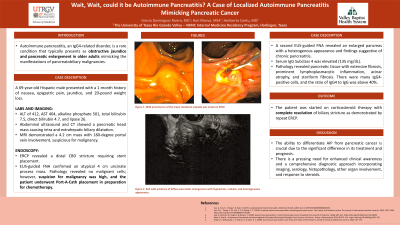Tuesday Poster Session
Category: Biliary/Pancreas
P2914 - Wait, Wait, Could It Be Autoimmune Pancreatitis? A Case of Localized Autoimmune Pancreatitis Mimicking Pancreatic Cancer
Tuesday, October 24, 2023
10:30 AM - 4:00 PM PT
Location: Exhibit Hall

Has Audio

Grecia Dominguez Rivera, MD
University of Texas Rio Grande Valley
Harlingen, Texas
Presenting Author(s)
Grecia Dominguez Rivera, MD, Hari Movva, MS, Heriberto Cantu, MD
University of Texas Rio Grande Valley, Harlingen, TX
Introduction: Autoimmune pancreatitis (AIP), an IgG4-related disorder, is a rare condition that typically presents as obstructive jaundice and pancreatic enlargement in older adults mimicking the manifestations of pancreatobiliary malignancies. Although the diagnosis of AIP has improved through growing awareness and proposed diagnostic criteria, differentiating between AIP and pancreatic cancer remains challenging.
Case Description/Methods: A 69-year-old Hispanic male presented with a 1-month history of nausea, epigastric pain, jaundice, and 20-pound weight loss. His medical history revealed type 2 diabetes. Physical exam showed scleral icterus, and laboratory results demonstrated an ALT of 412, AST 404, alkaline phosphate 501, total bilirubin 7.5, direct bilirubin 4.7, and lipase 26. CA 19-9 and CEA were negative.
Abdominal ultrasound and CT showed a pancreatic head mass causing intra and extrahepatic biliary dilatation. MRI demonstrated a 4.2 cm mass with 180-degree portal vein involvement, suspicious for malignancy. ERCP revealed a distal CBD stricture requiring stent placement. EUS-guided FNA confirmed an atypical 4 cm uncinate process mass. Pathology revealed no malignant cells; however, suspicion for malignancy was high, and the patient underwent Port-A-Cath placement in preparation for chemotherapy. A second EUS-guided FNA revealed an enlarged pancreas with a heterogenous appearance and findings suggestive of chronic pancreatitis.
PET-CT scan showed diffuse prominence of the pancreatic head with increased uptake. Autoimmune Pancreatitis was thus considered. Serum IgG Subclass 4 was elevated (135 mg/dL). Pathology revealed pancreatic tissue with extensive fibrosis, prominent lymphoplasmacytic inflammation, acinar atrophy, and storiform fibrosis compatible with autoimmune pancreatitis. There were many IgG4-positive cells, and the ratio of IgG4 to IgG was above 40%. The patient was started on corticosteroid therapy with complete resolution of biliary stricture as demonstrated by repeat ERCP.
Discussion: The ability to differentiate AIP from pancreatic cancer is crucial due to the significant difference in its treatment and prognosis. There is a pressing need for enhanced clinical awareness and a comprehensive diagnostic approach incorporating imaging, serology, histopathology, other organ involvement, and response to steroids. In this case, the premature placement of a Port-A-Cath for anticipated chemotherapy highlights the importance of increased disease awareness to avoid unnecessary interventions.
Disclosures:
Grecia Dominguez Rivera, MD, Hari Movva, MS, Heriberto Cantu, MD. P2914 - Wait, Wait, Could It Be Autoimmune Pancreatitis? A Case of Localized Autoimmune Pancreatitis Mimicking Pancreatic Cancer, ACG 2023 Annual Scientific Meeting Abstracts. Vancouver, BC, Canada: American College of Gastroenterology.
University of Texas Rio Grande Valley, Harlingen, TX
Introduction: Autoimmune pancreatitis (AIP), an IgG4-related disorder, is a rare condition that typically presents as obstructive jaundice and pancreatic enlargement in older adults mimicking the manifestations of pancreatobiliary malignancies. Although the diagnosis of AIP has improved through growing awareness and proposed diagnostic criteria, differentiating between AIP and pancreatic cancer remains challenging.
Case Description/Methods: A 69-year-old Hispanic male presented with a 1-month history of nausea, epigastric pain, jaundice, and 20-pound weight loss. His medical history revealed type 2 diabetes. Physical exam showed scleral icterus, and laboratory results demonstrated an ALT of 412, AST 404, alkaline phosphate 501, total bilirubin 7.5, direct bilirubin 4.7, and lipase 26. CA 19-9 and CEA were negative.
Abdominal ultrasound and CT showed a pancreatic head mass causing intra and extrahepatic biliary dilatation. MRI demonstrated a 4.2 cm mass with 180-degree portal vein involvement, suspicious for malignancy. ERCP revealed a distal CBD stricture requiring stent placement. EUS-guided FNA confirmed an atypical 4 cm uncinate process mass. Pathology revealed no malignant cells; however, suspicion for malignancy was high, and the patient underwent Port-A-Cath placement in preparation for chemotherapy. A second EUS-guided FNA revealed an enlarged pancreas with a heterogenous appearance and findings suggestive of chronic pancreatitis.
PET-CT scan showed diffuse prominence of the pancreatic head with increased uptake. Autoimmune Pancreatitis was thus considered. Serum IgG Subclass 4 was elevated (135 mg/dL). Pathology revealed pancreatic tissue with extensive fibrosis, prominent lymphoplasmacytic inflammation, acinar atrophy, and storiform fibrosis compatible with autoimmune pancreatitis. There were many IgG4-positive cells, and the ratio of IgG4 to IgG was above 40%. The patient was started on corticosteroid therapy with complete resolution of biliary stricture as demonstrated by repeat ERCP.
Discussion: The ability to differentiate AIP from pancreatic cancer is crucial due to the significant difference in its treatment and prognosis. There is a pressing need for enhanced clinical awareness and a comprehensive diagnostic approach incorporating imaging, serology, histopathology, other organ involvement, and response to steroids. In this case, the premature placement of a Port-A-Cath for anticipated chemotherapy highlights the importance of increased disease awareness to avoid unnecessary interventions.
Disclosures:
Grecia Dominguez Rivera indicated no relevant financial relationships.
Hari Movva indicated no relevant financial relationships.
Heriberto Cantu indicated no relevant financial relationships.
Grecia Dominguez Rivera, MD, Hari Movva, MS, Heriberto Cantu, MD. P2914 - Wait, Wait, Could It Be Autoimmune Pancreatitis? A Case of Localized Autoimmune Pancreatitis Mimicking Pancreatic Cancer, ACG 2023 Annual Scientific Meeting Abstracts. Vancouver, BC, Canada: American College of Gastroenterology.
